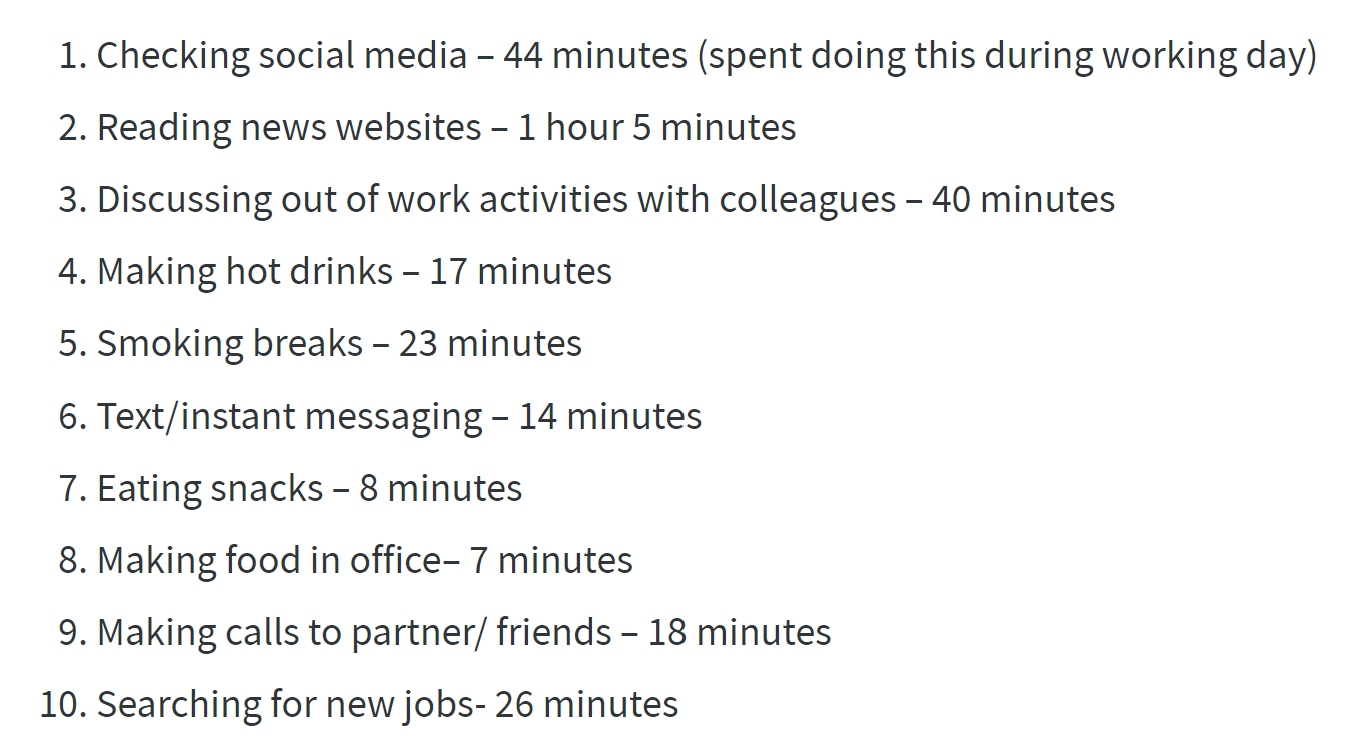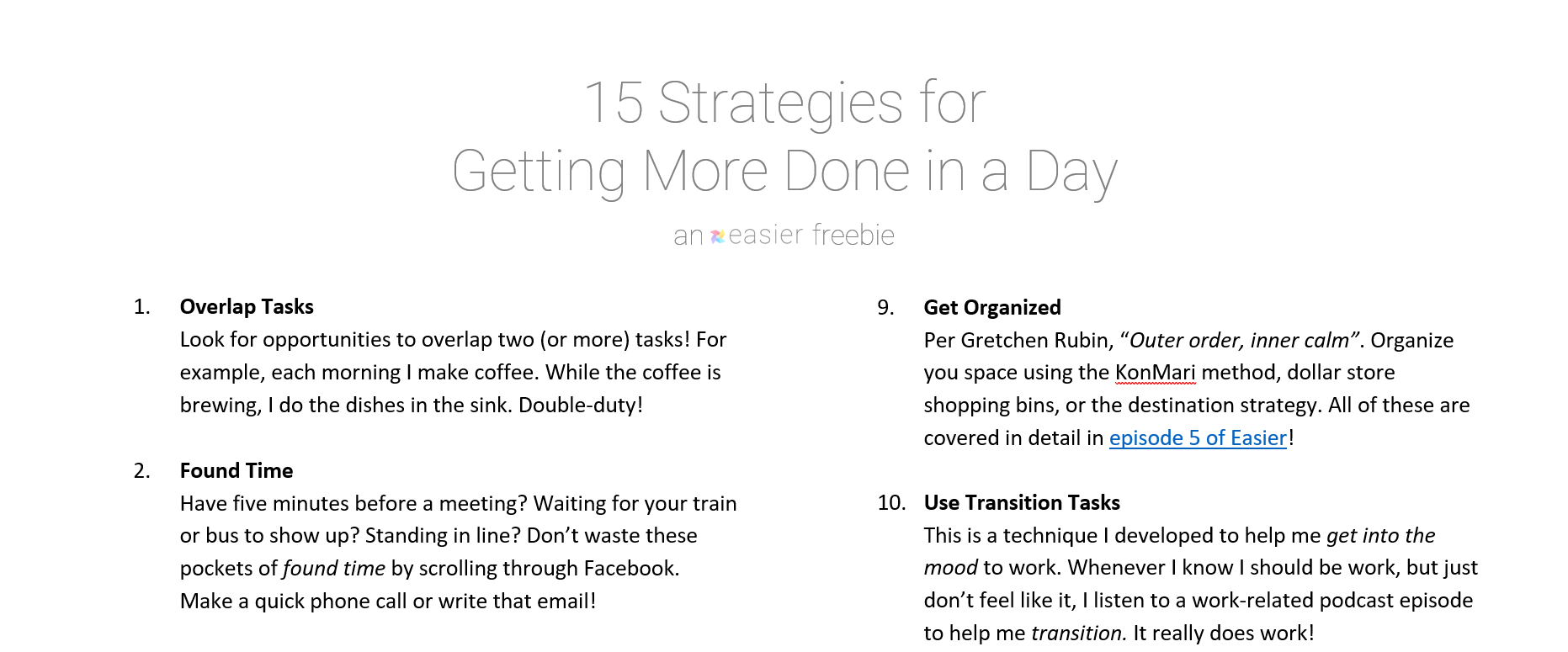Table of Contents
Key Points
Looking for the highlights of this post? Here you go!
- We’re working too many hours. People and science agree.
- Employers would benefit in myriad ways, including financially, if they would encourage healthier work rules. These include:
- Working fewer hours each week (fewer than 40)
- Taking more breaks
- Taking more vacation
- Millennials are the biggest generation in the workforce today, and they expect work rules that allow for flexibility and control. Businesses will need to adapt to stay competitive.
- Businesses have a financial incentive to adapt modern work rules.
Work Rules Are Killing Your Productivity, A Theory
Part One — Episode 51 — September 18, 2019
As I mentioned, I’m doing something a bit unusual this week. The format is funky. And, in keeping with that, my method is gonna be funky too.
…I’m in a GIF mood today, so get ready. Anyway…
Ahead of researching the topic, I’m jotting down some thoughts first. I’m giving this episode the scientific-method treatment: State some hypotheses, test them, and report the findings.
I’m going to rigorously challenge these assumptions about work rules as I research them. It’s my goal to disprove my assumptions just as much as it is to prove them. In other words, I’m looking for facts, and that’s what you’ll get.
But still, I thought it would be interesting to share my hypotheses with you first, and then report on whether or not I was right.
So, without doing any research, and relying only on what’s in my head from past reading and studying, here are my hypotheses about current work rules being, well, terrible:
My Hypotheses
Hypothesis #1: Overtime is counterproductive
Based on numerous books and articles I’ve read, I’ve come to the conclusion (in my own mind) that overtime is ineffective, and perhaps counterproductive.
My understanding, which I’m setting out to prove today, is that folks who work overtime do more harm than good in the long run. This is because working beyond 40 hours (which may be arbitrary, well get to that in a bit) can push folks toward burnout.
Hypothesis #2: Busyness is not the same productivity
Folks love to claim that they are too busy. I tend to agree that they’re busy, but overall I’m skeptical: I wonder if they’re busy doing the right things.
I also wonder if they’re busy because they waste time doing unnecessary or unimportant things.
In the past, I had colleagues who would hem and haw about how much work they had on their plates, how they never had time to get it done, and how they would have to stay late because it was too much.
It was true that they had a lot to do and that they stayed late. But, from my vantage point, if they would have stopped spending so much time gossiping in our boss’ office, they could have used business hours to get their work done.
And, to make matters worse, my boss was the ringleader of this particular circus. She orchestrated the extended gossip sessions, wasting countless hours. And then, she’d complain that she never had time to get anything done.
I’m setting out to challenge all of this today.
Hypothesis #3: Busyness, overtime, and overwork are not badges of honor
I have a special name for folks that wear their overwork and the busyness (non-productive busyness) as a badge of honor: I call them martyrs.
MARTYR | NOUN
A person who displays or exaggerates their discomfort or distress in order to obtain sympathy or admiration.
These are the folks that hold the number of hours they work up as the be-all end-all of their commitment to their employer. They work crazy hours, therefore they must be crazy dedicated. And anyone else who doesn’t do the same is lazy, ineffective, disloyal, etc.
If you can’t tell already, this type of martyrdom drives me crazy.
As I assumed above, busyness does not equal productivity. In my mind, if I struggle to complete my work during business hours, that’s a sign that I need to optimize somewhere. It should be my goal to leave on time. And, it should be my employer’s goal, too.
Hypothesis #4: 40 hours per week is arbitrary, antiquated, and possibly counterproductive
Assumption: 40-hour work weeks are idiot sandwiches.
Mostly because I love Gordon Ramsay and wanted to use this gif. But that’s neither here nor there.
FACT: 40-hour work weeks are dumb and arbitrary.
Well, I think they are, anyway.
ACTUAL FACT: This is another idea I’ve picked up from reading I’ve done that I can’t quite pin down. Yet.
Along these lines, I also have in my head that Henry Ford’s factory workers were studied to deduce that 40 hours was the optimal work time. And somehow, this notion then took hold globally. The 40-hour work week got such a strong grip on society that most folks just assume that 40 hours is the way it’s always been.
I have a strong hunch that that’s completely false. We’ll see.
Hypothesis #5: We don’t take enough breaks
This one ties into busyness and martyrdom. We can really show the boss we care by never leaving our desks. Hell, why not build toilets into our offices so we can work while we pee?
Actually, it’s my assumption that we function better when we take regular, meaningful breaks.
Hypothesis #6: We don’t take enough vacation
Finally, I don’t think we take enough vacation. And, I think that’s so because much of our current work cultures pride the “I never use my time off” mantra as another badge of honor.
My Assertions
Based upon my hypotheses, I draw some conclusions about work rules and how they should change. I’m calling them assertions.
Easier is about optimizing life, right? So, if my assumptions are correct, and we’ve not been doing the best we can when it comes to our employment, then we have some work to do in optimizing, well, work.
Assertion #1: Employees should be expected to leave work on time
Martyrs need to take a seat. Employers need to wake up.
If it’s true that overtime is counterproductive, then it stands to reason that overtime should be eliminated. And, I’m not talking about one-off situations where folks need to get something done. I’m referring to systemic expectations that folks need to “come in early and stay late” to be considered competent and loyal.
Overwork is harmful, I assume, and therefore, it should not only be okay for employees to leave on time, it should be expected that they do.
Assertion #2: Employees should be expected to take breaks throughout the day
No more lunchtime martyrdom. It’s not good to proudly announce that you always eat lunch at your desk.
You’re more productive when you’re not running on fumes, and when you’ve had time to let your mind relax.
Assertion #3: Employees should be expected to use their vacation time
This one’s pretty self-explanatory.
Juicy tidbit though: I’m pretty sure I’ve read of a company that mandates that employees take time off and randomly selects folks to take extended time off.
I’m going to find that and share it in my research!
Assertion #4: If employees are productive, it shouldn’t matter where they work
Butts in seats is ridiculous. Who cares whether I’m physically in the office or sitting on a beach with my laptop? If the work is getting done, I’m doing my job.
This one, in my head, boils down to trust. Employers feel the need to helicopter over their employees like soccer moms chaperoning the prom. They monitor the number of nanoseconds folks spend at their desks, out to lunch, on non-work sites, etc. Who cares!?
Back off, give employees space, trust, and clear expectations, and they’ll perform. And for the ones who don’t, deal with that on a case-by-case basis. If you’re hiring effectively, under-performing employees should be the exception, not the rule.
Assertion #5: These assertions benefit both you and your employer
It is my gut feeling that, when employees are happy and cared for, they do right by their employers. They go that extra mile, they are cheerful and productive, and they stick around for much longer.
Most folks think that the customer (whomever that might be in your case — when I worked at the school, our “customers” were students and parents) is king. Gendered metaphor aside, the customer is not king, the employees are.
I’ll say it again: Take care of your employees, they’ll take care of you and your customers.
Assertion #6: The work week should be shorter than 40 hours
Based on the hypothesis that 40 hours per week is arbitrary and possibly counterproductive, it follows that I think we should work fewer hours.
I don’t know about you, but somewhere in the 4-6 hour range at work, I’m sluggish and my productivity is shot. The last couple hours always feels like a complete slog.
Work Rules Are Killing Your Productivity, The Research
Part Two — Episode 52 — September 25, 2019
As I explained back in episode #51, I had a number of theories floating around in my head about work rules. I’d gathered these from various reading and studying I’ve done over the past few years.
But, I wasn’t really able to pin down anything concrete, let alone point to the sources of my thinking.
So, in episode #51, I laid out some hypotheses about work rules without first researching them. Then, I set out to prove (or disprove) what I believed to be true.
Turns out, much of what I’d theorized, based on that past reading and studying, was accurate. Keep in mind that I didn’t invent these ideas; I merely remembered them.
Here are the results of that research on work rules, organized and (hopefully) cohesive!
40-hour work weeks are largely arbitrary
Folks think that 40-hour work weeks are just the way things are. They’ve become so ubiquitous that nobody really questions them.
Not any more! I’m pushing back on this arbitrary and movable standard.
A brief history of the 40-hour work week
Prior to the 1900s, employees were expected to spend significantly more hours at work. It was not uncommon for folks to expect to work six days per week, and to put in 10-12 hours per shift.
During the first couple decades of the 20th century, several moves were made to nudge employers to shorten work hours. These included labor unions pushing for a change (as early as the 1880s), Henry Ford instituting eight-hour days in 1914, and the federal government passing a law requiring similar shifts for the railroad industry.
It wasn’t until 1938 when Franklin Roosevelt signed the Fair Labor Standards Act into law that the eight-hour work day became the law, and ultimately the norm (Source: PolitiFact).
Ford does deserve credit for adopting shorter working shifts, but he was hardly the first employer to do this, and the now-standard working schedule did not become federal law — and thus a right for all workers — until almost a quarter-century after Ford’s move. Meanwhile, experts said, unions do deserve credit for keeping the working-hours issue alive, at significant personal sacrifice, for 70 years.
We’re not all railroad workers
Keep in mind that these changes were originally instituted for the railroad industry (Source: The New Stack). Not sure about you, but I think most folks work in industries outside rail at this point.
Given that, I think it’s time to at least consider the assumptions we’re making when it comes to what the hours-worked standard is.
The line is arbitrary
Studying the history of the hours requirement, even briefly, proves that the standard is completely arbitrary.
I acknowledge that the line moved slowly during the end of the 19th and beginning of the 20th centuries. However, that it moved at all is key!
The economy didn’t fall apart, and business didn’t disappear as a result of a shorter work day. In fact, I’d argue that the opposite happened, as we’ll discuss in a bit.
Overall, my point here is that, if business and employees survived, and thrived, by going from between 60 and 72 hours per week down to 40, maybe 40 isn’t so set in stone.
We can be just as, if not more productive with fewer hours
I think that the big pushback we get when suggesting shortening working hours is that productivity will take a huge hit. If employees aren’t at work, they’re not working, and therefore things won’t get done.
I call BS! Let’s discuss:
Folks don’t spend 8 hours per day actually working
Right out of the gate, we’ve got to banish the idea that anyone can work for eight solid hours.
Think about it: How often have you ever worked for eight straight hours. Never, right? And even if you have worked eight hours in a row, did your productivity stay constant the whole time? Absolutely not.
In fact, research suggests that, on average, we only spend about three of our eight work hours actually working. Just. Three. Hours.
While we’re at work, we’re spending time doing everything from checking social media (44 minutes daily), to chatting with coworkers (40 minutes daily), to making food and hot drinks (32 combined minutes daily). Check out the full chart from vouchercloud (they conducted the study):

Source: vouchercloud
This means that the eight-hour workday is an illusion. On average, we spend the vast majority — more than 60% — of our workday not working.
I will concede that that’s not likely to be the case 100% of the time and for all people. Some folks do put in serious, productive hours. But even then, my first question would be about whether or not they can sustain those hours long-term.
In any case, on the whole, we’re not working for eight hours. Not even close. So, I then wonder: Why do we hold employees hostage at work for all of this unproductive time? Especially when the work hours expectation is arbitrary and movable (as we discussed in the previous section)?
To make matters worse, our productivity tanks the longer we try to sustain it (Source; Business Insider). It’s part of the reason why we feel so sluggish at about 2 PM each work day.
Toward the end of the day, performance begins to flatline or even worsen, K. Anders Ericsson, an expert on the psychology of work, said.
To me, this is a totally inefficient and counterproductive use of everyone’s time. I argue that we should let employees have this time back. It will, as we’ll see in coming sections, prove to be beneficial for physical and mental health and productivity.
Our brains aren’t even wired to work for 8 hours straight
Hammering home this we’re-not-working-for-eight-hours point: We’re not even wired to do it! Scientifically speaking, our brains are only wired to work about four hours per day According to The Guardian, relying on Rest: Why You Get More Done When You Work Less by Dr. Alex Soojung-Kim Pang, our brains are not built for eight-hour focus sessions.
In his work studying rest, Pang discovered that historically-extraordinary individuals — folks who were extraordinarily productive like Stephen King, Charles Darwin, Charles Dickens, Ray Bradbury, etc. — didn’t work crazy hours. They worked a sustained 90-120 minutes a couple times per day with decent breaks in between.
Check out Dr. Pang’s video on work, focus, and rest:
The fact that our brains aren’t wired for extended productivity explains why we spend 60% of our work days doing non-work things.
The point isn’t that the world would be a lovelier place if nobody felt forced to work long hours, though that’s true. It’s that in any remotely creative job, a culture that doesn’t allow for rest is self-defeating, even just for the bottom line.
I believe that we should break the ridiculous hostage situation in which we’ve all found ourselves, acknowledge the illusion we’ve created, and put an end to it!
We’re not built to work for eight hours, therefore we’re not working eight hours, therefore we should stop trying to work for eight hours!
And, as we’ll soon discuss, when we push ourselves beyond our limits, it takes a toll on our health and our productivity.
We’re sick less often when we’re not overworked
From a business standpoint, work can only get done when folks are able to do it. Don’t need a source for that.
Where I do need a source is when I assert that working an appropriate amount keeps us healthier. Sage People and The Guardian both report on a trial done in Sweden beginning in 2015 proved that a shorter work day resulted in less sick leave taken by employees.
So, to put it another way: Reduced work hours results in healthier people, therefore increased work hours results in more sickness. Overwork literally makes us physically ill.
In Japan, they have a word for this: Karoshi. It translates literally to death from overwork. Yes, death. Folks in Japan, and certainly elsewhere, have been working themselves so hard that they die (from various causes, including heart failure and suicide) (Source: Business Insider).
I don’t know about you, but there aren’t many jobs I’d be willing to die for. I’m not so keen on getting sick for or from a job either. And I’m sure that most folks feel the same.
We’re more productive when we’re not overworked
I think this one is pretty cut-and-dry: When we’re not exhausted, we’re more productive.
Linus Feldt, CEO of the Swedish startup Filimindus, explained of his decision to shift to a six-hour work day: “My impression now is that it is easier to focus more intensely on the work that needs to be done and you have the stamina to do it and still have energy left when leaving the office.” (Source: Daily Mail)
We trade busyness for productivity with fewer work hours
This goes back to my hypotheses about busyness and martyrdom. We’re wasting all kinds of time at work, complaining about how busy we are, and then making up for in long overtime hours.
It’s absolutely ridiculous, and a cycle we should vigilantly work to erase.
The answer, to me, seems to be fewer hours worked, but increased focus and attention during working time. Inc.com likens this idea to working out: high bursts of intensity for shorter periods of time.
Shorter work weeks have already been tried. They worked!
The notion of a shorter work week isn’t a just a theory. It’s a tried-and-tested strategy that’s worked both in New Zealand and Sweden (and likely other places too).
In New Zealand, the firm Perpetual Guardian experimented by giving their employees an extra day off per week while holding pay and benefits constant. The result? Employees were 20% more productive! (Source: Brink News)
And, in Sweden, the government experimented with six-hour work days. The trial resulted in increased job satisfaction, happiness, health, and productivity for staffs. Another consequence however was increased cost on the government. Firms needed to hire additional staff to cover gaps left in schedules. (Source: BBC)
That actually leads me to a tangential, but related point: If staffs can be happier, healthier, and more productive by working less, with the byproduct being increase expense, what does that say about our values? It would suggest to me that folks are saying, “I don’t really care if these expectations are unhealthy. Let’s save the money and overwork the staff.” Don’t know about you, but I don’t really love that message.
It’s time to make the switch
Overall, shortened work hours, whether they come in the form of an extra day off or shorter work hours, are beneficial to employees and to businesses.
It’s time to ditch the 40-hour work week.
Overtime is counterproductive. Employees should be expected to leave on time.
I’ve already railed quite a bit about the impacts overwork can have on employees. But, I gathered a number of additional resources as I was researching that support this idea.
All of the below suggest that overtime is harmful to both employers and employees.
According to a recent study from the Aragon Institute of Health Sciences, people who work more than 40 hours a week increase their risk of burnout six-fold, in comparison to people who work less than 35 hours a week.
- Why Working Overtime Is Never A Good Idea, Entrepreneur.com
- The Disadvantages of Overtime, Chron.com
- Why Overtime is Killing Your Business, Wonolo
- Memo to work martyrs: Long hours make you less productive, CNBC
- Overtime: How to Lose Your Employees and Kill Your Business, Jason Lengstorf
Given that overworked employees are less productive and more error-prone, it is in an employer’s best interest to insist that their employees take care of themselves and leave on time.
We should take more breaks
According to Tony Schwartz, found of The Energy Project, “We need to purposely take short breaks every 90 minutes throughout the day to drink water, walk, or to eat healthy snacks.” This is to help us align with our body energy’s natural ebb and flow. (Source: Forbes)
Frequent breaks breaks are restorative, good for mental and physical health. They increase productivity, creativity, and our drive to complete our goals. They also help to consolidate memories and improve learning. (Source: Psychology Today)
In all, if we want to be as productive as we can, and our employers certainly will want that too, the expectation should be that we take frequent, meaningful breaks throughout the day.
We should take more vacation
Vacation-sized breaks are also incredibly beneficial.
I have to, briefly, return to work martyrs here. Have you ever encountered a coworker who believe the sun shined so brightly out their butt that the entire workplace would fall apart if they weren’t there? I worked with someone like this for years.
She truly believed that the entire place would go down in flames if she ever took time off. She’d schlep herself in while sick (getting others around her sicking), she’d never take vacation, and she worked many hours of overtime.
Want to know what ultimately happened to her? She was fired. Want to know what ultimately didn’t happen? The place imploding on itself.
As Abby Lee from Dance Moms would say:
To that end, quit being a martyr and take your breaks and vacation. And, if the place really will fall apart if you leave, it’s time for your employer to bring in some more folks.
You’re actually more likely to get ahead if you take vacation
According to Harvard Business Review, “People who took fewer than 10 of their vacation days per year had a 34.6% likelihood of receiving a raise or bonus in a three-year period of time. People who took more than 10 of their vacation days had a 65.4% chance of receiving a raise or bonus.”
I think that speaks volumes to employees all for itself. As for employers, start valuing your employees’ time off!
Burnout is real
This goes hand-in-hand with our conversation on overwork and overtime. Burnout is a real thing.
From SHRM, “Given … workplace pressures, Mark Gorkin, a stress resilience expert and consultant in Columbia, Md., said he believes that the typical 24/7 ‘always-on’ work culture is causing increased employee burnout.”
As we discussed, breaks are beneficial. Same goes for vacation.
Frequent time away from work allows us to rest, rejuvenate, and come back refreshed.
Also according to SHRM, “Employees are increasingly aware that if they take time off, they will perform better at work. In his book The Happiness Advantage: The Seven Principles of Positive Psychology That Fuel Success and Performance at Work (Crown Business, 2010), Shawn Achor cites research from the American Psychological Association that found when ‘the brain can think positively, productivity improves by 31 percent, sales increase by 37 percent, and creativity and revenues can triple.’
Again, it’s in everybody’s best interest to take vacation. People thrive, and then so do businesses.
Millennials expect better expectations. Workplaces will need to adapt.
The last point I’ll make here is that, whether or not businesses want to shift their work rules, they might not have a choice.
As of the writing of this post (September 2019), Millennials make up the largest generation in the US labor force (Source: Pew Research). And Millennials aren’t going to keep putting up with these terrible, counterproductive work rules.
Millennials value less waste, more control, and more flexibility when it comes to our employment. According to Forbes, “Millennials know what they want. Millennials want more control over their careers and their workdays. They want to work for innovative companies. They reported that pay and financial benefits are important when it comes to choosing employment, but they also value work/life balance, opportunities for leadership, and flexible work schedules.”
Ultimately, this means that businesses stuck in the Baby Boomer era are going to struggle to keep up with the demands of a modern workforce.
As I’ve said quite a few times, it would behoove everybody — everybody — if businesses would climb on board.
Conclusion: Better Work Rules Lead to Happier, Healthier Employees AND Businesses
In over 4000 words, I’ve managed to beat this point into oblivion: Antiquated work rules suck and they need to die.
The faster businesses catch on, and the faster they adjust these work rules to align with modern expectations, the happier they, and their employees, will ultimately be.
Additional Sources
Updated October 2, 2019
I’ve been collecting more sources that talk about dumb work rules since writing this post. I’m going to keep a running list of them here!
- 4-Day Workweek Boosted Workers’ Productivity By 40%, Microsoft Japan Says — NPR
- The average American worker takes less vacation time than a medieval peasant — Business Insider
- Here’s Why Time Off Work Actually Improves Your Work and Life — Pocket Worthy
Related Episodes
Get the Free Download!
15 Strategies for Getting More Done in a Day
I have a fantastic freebie I'd love to send to you. It's a one-page guide that covers my favorite 15 strategies for making the most out of every day.
Click below to grab this download now!



